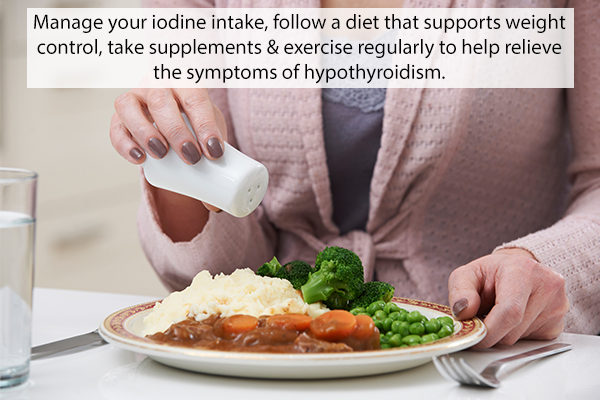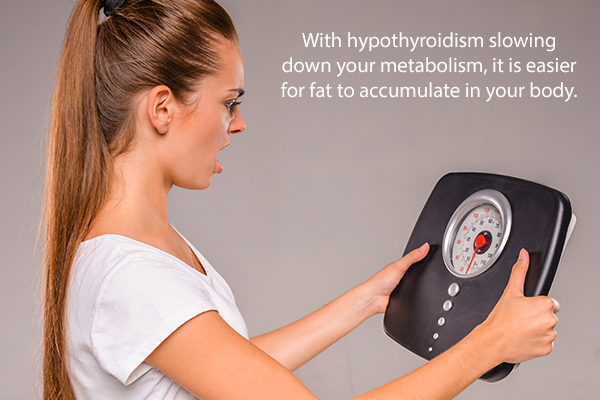In this article:
The thyroid gland is a butterfly-shaped organ situated in the lower portion of the neck. It secretes certain hormones into the blood that play a crucial role in energy utilization, cell metabolism, maintaining proper body temperature, and the functioning of various vital organs.

The insufficient production of thyroid hormones due to a dysfunctional thyroid gland is known as hypothyroidism, which is common and easy to manage but potentially dangerous if left untreated.
Home Remedies
You can try the following dietary interventions to aid the functioning of your thyroid gland and reduce the symptoms of hypothyroidism.
Caution: Before trying any of these remedies, consult your doctor to rule out any potential health risks. This is especially true for supplements that can hamper the absorption of your standard hypothyroidism medications such as levothyroxine.
1. Vitamins D and B12
Hypothyroidism is associated with hypovitaminosis of vitamins D and B12. Studies showed that taking these vitamins in supplement form was found to help improve the deficiency and associated symptoms. (1)(2)(3)
Sources of vitamins D and B12:
- Some of the best food sources of vitamin D to include in your daily diet are eggs, dairy products, fish, and mushrooms.
- Some of the best food sources of vitamin B12 include poultry, dairy products such as yogurt, haddock, and yeast-containing items.
- If you don’t get enough of these nutrients through your diet, ask your doctor about starting you on a supplement.
Caution: Stick to the prescribed dosage, as overconsumption of vitamin D can cause excess calcium deposits in the bones, blood vessels, and kidneys.
2. Selenium

Selenium is an important constituent of selenoproteins and various enzymes that are essential for reproduction and the metabolic activities of thyroid hormones. This mineral is concentrated in the thyroid gland, while traces can be found in muscle tissues.
A study conducted in 2015 found that zinc and selenium exhibited effects on thyroid functioning in overweight hypothyroid females. (4)
Sources of selenium:
- Brazil nuts, eggs, and brown rice are loaded with selenium and should be added to your regular diet.
- If you fail to meet your required intake through diet alone, speak to your doctor about starting you on a supplement.
3. Zinc
Your body needs zinc along with other trace minerals, namely, selenium and copper, to produce thyroid hormones, and these hormones conversely play a crucial role in the absorption of zinc.
Thus, a lack of zinc can result in hypothyroidism, whereas a deficiency of thyroid hormones can hamper zinc absorption and pave the way for an acquired zinc deficiency over time. (5)(6)
Sources of zinc:
- You should first try to fulfill your zinc requirement through food sources, such as chicken, legumes, oysters, and yogurt. Ask your doctor to recommend the appropriate intake.
- If your diet proves insufficient, only then may you consider taking a supplement, but after consulting your doctor about the proper dosage and interval.
Caution: Overdosing on zinc can cause considerable digestive distress, nausea, and vomiting and may inhibit copper absorption.
4. Probiotics
A 2014 study stated that small intestinal bacterial overgrowth (sibo) is common in patients with hypothyroidism, and probiotics are a good way to treat this overgrowth. (7)
Sources of probiotics:
- Various foods are naturally endowed with probiotics, such as yogurt, kimchi, and sauerkraut. Add these items to your regular diet.
- You can consider taking a probiotic supplement but only after running it by your doctor.
5. Coconut oil
Coconut oil may not be the healthiest cooking oil due to its high saturated fat content, but it is considered quite beneficial in managing thyroid dysfunction.
Much of this acclaim is anecdotal without any solid scientific backing, so you are advised to consult your doctor about whether this is a suitable choice for you.
Generally speaking, the cautious use of coconut oil may potentially improve your hypothyroidism symptoms and is unlikely to any harmful side effects. Consume a tablespoon of unrefined organic coconut oil daily, either directly or by adding it to your cooking.
Self-Care and Lifestyle Tips

Generally, no specific diet can help relieve the symptoms of hypothyroidism. It is vital to consume a healthy, well-balanced diet that includes a variety of foods to maintain good health.
While there is no evidence to support the consumption or avoidance of certain foods for improving thyroid function, you may consult a nutrition professional for a diet that supports your medications.
The use of supplements may be considered only upon consultation with your doctor. He will analyze whether you need supplements and accordingly alter the dosage to prevent any adverse reaction with the thyroid drugs.
Here are some dietary considerations to keep in mind when dealing with hypothyroidism:
1. Manage your iodine intake
Iodine is essential for the normal functioning of the thyroid gland. The majority of your iodine intake is through the consumption of iodized salt added to foods, but you may also take supplements if required.
Consult your doctor before starting iodine supplements, as iodine consumption can cause harmful side effects in people with autoimmune disorders such as Hashimoto’s disease.
Iodine supplements or foods with high iodine content, such as kelp, dulse, and other seaweeds, can cause or aggravate hypothyroidism. Follow a diet helpful for weight control. Obesity is a significant risk factor for hypothyroidism, and vegans are less likely to develop hypothyroidism.
A study conducted in 2013 showed an association between a vegan diet and a lowered risk of hypothyroidism. (8)
Another study found an increase in oxidative stress in women who were undergoing thyroxine replacement for Hashimoto’s disease. Results showed that a normal BMI and daily consumption of fruits and vegetables were associated with the lowering of oxidative stress levels. (9)
2. Exercise regularly
Aerobic exercises can help improve blood circulation, burn calories, boost metabolism by increasing muscle mass, and enhance the circulation of thyroid hormones. All these factors might contribute to the improvement of symptoms that are associated with hypothyroidism. (10)(11)
Note: Since an underactive thyroid can slow down the heart rate, sudden exercises can cause a sudden increase in the heart rate, which may be harmful. Therefore, heavy, strenuous activities should be avoided until you are certain that your thyroid condition is under good control. It is vital to consult your doctor before starting any exercise routine.
Does Hypothyroidism Cause Weight Gain?

Hypothyroidism slows down your metabolism. Thus, it is easier for fat to accumulate in your body. Additionally, hypothyroidism makes losing weight difficult due to the improper functioning of the body.
However, not all patients with hypothyroidism have excessive fat. Generally, the extra weight may be a result of excess retained salt and water. In some severe cases, weight gain may be caused by myxedema.
Often, weight gain associated with severe cases of hypothyroidism can lead to sleep apnea, which is a sleep disorder that is associated with repetitive pauses in breathing while asleep. This condition results in disturbed sleep and daytime sleepiness.
Final Word
Hypothyroidism is generally a disorder that is easy to diagnose and treat with a low risk of side effects leading from such treatment. It is important to follow up regularly with your healthcare provider so that they can determine whether it is appropriate to screen you for thyroid dysfunction.
If your general practitioner has difficulty getting your thyroid levels balanced, then you may benefit from seeing an endocrinologist, a specialist in thyroid disorders.

- Was this article helpful?
- YES, THANKS!NOT REALLY


